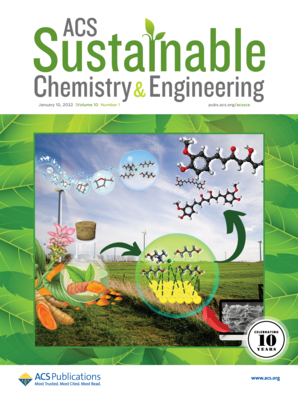通过熔融碳酸盐的电化学还原将CO2转化为多孔碳作为高性能钠离子电池阳极
IF 7.3
1区 化学
Q1 CHEMISTRY, MULTIDISCIPLINARY
引用次数: 0
摘要
钠离子电池在锂离子电池中的流行促使人们探索钠离子电池(SIBs)作为锂离子电池(lib)的可行替代品。硬碳已成为sib极具前景的阳极材料,但其合成存在可持续性挑战,并会排放污染物。在这里,我们引入二氧化碳衍生的多孔碳(石墨和非晶)作为sib的阳极,通过在熔融共晶碳酸盐盐中在较低温度下电化学还原二氧化碳,产生具有可控微观结构,形态和孔隙度的材料,有利于储能。作为SIB阳极,我们的二氧化碳衍生碳具有卓越的比容量,优越的倍率能力和稳定的循环性能。这一创新战略利用二氧化碳废弃物推进SIB能源技术。本文章由计算机程序翻译,如有差异,请以英文原文为准。

Transforming CO2 to Porous Carbon as a High-Performing Sodium-Ion Battery Anode via Electrochemical Reduction in Molten Carbonates
The prevalence of sodium over lithium prompts exploration of sodium-ion batteries (SIBs) as a viable alternative to lithium-ion batteries (LIBs). Hard carbon has emerged as a promising anode material for SIBs, yet its synthesis poses sustainability challenges and emits pollutants. Here, we introduce CO2-derived porous carbon (graphitic and amorphous) as an anode for SIBs via electrochemical reduction of CO2 in a molten eutectic carbonate salt at a lower temperature that yields materials with controlled microstructure, morphology, and porosity conducive to energy storage. Our CO2-derived carbon demonstrates remarkable specific capacity, superior rate capability, and stable cycling performance as a SIB anode. This innovative strategy harnesses waste CO2 toward advancing SIB energy technology.
求助全文
通过发布文献求助,成功后即可免费获取论文全文。
去求助
来源期刊

ACS Sustainable Chemistry & Engineering
CHEMISTRY, MULTIDISCIPLINARY-ENGINEERING, CHEMICAL
CiteScore
13.80
自引率
4.80%
发文量
1470
审稿时长
1.7 months
期刊介绍:
ACS Sustainable Chemistry & Engineering is a prestigious weekly peer-reviewed scientific journal published by the American Chemical Society. Dedicated to advancing the principles of green chemistry and green engineering, it covers a wide array of research topics including green chemistry, green engineering, biomass, alternative energy, and life cycle assessment.
The journal welcomes submissions in various formats, including Letters, Articles, Features, and Perspectives (Reviews), that address the challenges of sustainability in the chemical enterprise and contribute to the advancement of sustainable practices. Join us in shaping the future of sustainable chemistry and engineering.
 求助内容:
求助内容: 应助结果提醒方式:
应助结果提醒方式:


